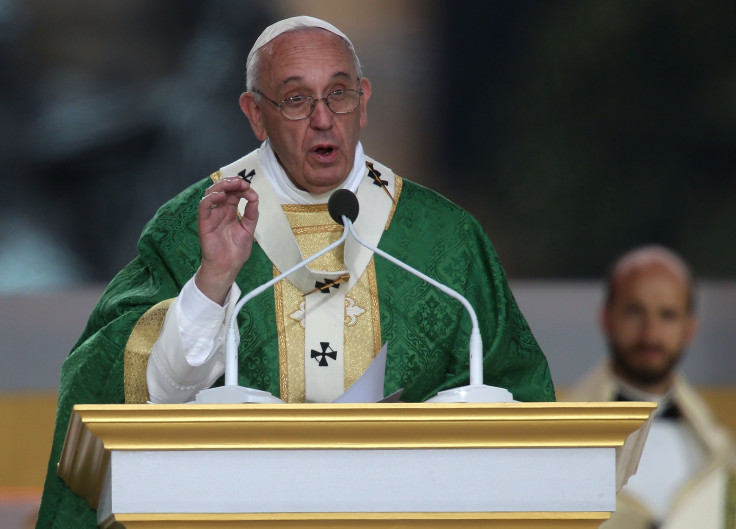Pope Defends Kim Davis? Francis Says Government Officials Have 'Human Right' To Deny Gay Marriage Licenses

On his way back to Rome Monday after a historic visit to the United States, Pope Francis made one last controversial statement on American current events: The pontiff told reporters aboard his plane that government employees enjoy the "human right" to refuse their duties on moral grounds. Though Francis did not mention her by name, many media outlets linked his comment to the case of Kim Davis, a Kentucky county clerk who was arrested earlier this month for refusing to issue marriage licenses to same-sex couples, NBC News reported.
A journalist asked the pope whether he supported "individuals, including government officials, who say they cannot in good conscience -- their own personal conscience -- abide by some laws or discharge their duties as government officials -- for example, when issuing marriage licenses to same-sex couples?"
Francis responded that although he couldn't take into consideration all such cases of conscentious objection, he did think it was a human right. Anyone who denies it is denying that right, he added. "Conscientious objection must enter into every juridical structure because it is a right, a human right. Otherwise we would end up in a situation where we select what is a right, saying, 'this right has merit, this one does not,'" the pope said, according to a Reuters translation.
The pope's comment appeared to extend to Davis, who has recently become a divisive figure. Davis was arrested Sept. 4 after being found in contempt of court for refusing to give marriage licenses to same-sex couples, despite a June 26 Supreme Court ruling legalizing gay marriage. Davis, an Apostolic Christian, said her conscience would "not allow it," USA Today reported. Rowan County deputy clerks began issuing the licenses when Davis went to jail and continued when she was ordered not to interfere.
Pope Francis, who's been widely hailed as a progressive leader since his 2013 election, has previously indicated that he doesn't think gay clergy members should be marginalized. "If a person is gay and seeks God and has good will, who am I to judge?" he said.
© Copyright IBTimes 2025. All rights reserved.





















